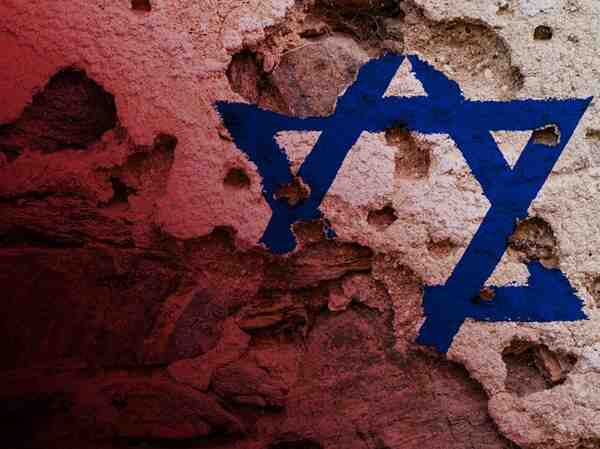
I’ve been thinking a lot about this article for some time now. London jewelers told the local Jewish newspaper that sales of Star of David jewelry has increased in some cases by more than 400 percent. A New York-based jeweler says demand for her Judaica rings and necklaces has soared sixfold. Think about that for a minute. A massive increase in out-facing symbols of Jewishness.
Something is happening, and it’s not fear or capitulation or defeatism. It’s Jewish Pride.
I was in a conference these past few days with execs of other large federations and other Jewish organizations and we’re sharing ideas and best practices. Of course, much of our dialogue is the same dialogue that we in Greater MetroWest are having too: what does the new Jewish future look like? What does Jew-hate look like and how do we combat it? And what are/should be the key priorities for American Jewish communal life as we look to the future? I have some thoughts on this, and was pleased to finish the meetings with more questions than answers. But send me your thoughts too, because the ideas of Jewish Pride and who we are deserve our time and attention and focus. As I said to colleagues the other day, we should wear our Jewishness not as a target on our backs, but as a badge of honor on our chests.
January 14th will mark 100 days since October 7th, when the hostages were abducted by Hamas. This morning our Federation professionals gathered in our lobby to mark the upcoming 100th day, in a very moving and meaningful way. We pray that before Day 100th, they will be able to return to their loved ones. But if they aren’t, we need to raise global awareness and mobilize advocacy efforts to bring them home. More on this to come.
So here we are. As fighting continues, additional IDF soldiers have been killed, including American-Israeli Yakir Hexter from Jerusalem; bringing the total number of IDF casualties since the ground offensive began to 188, (and to 520 since October 7). As fighting continues in Gaza, mainly in the southern city of Khan Younis, troops have discovered a Hamas tunnel where it believes hostages were previously held (see footage here). The tunnel connects to a wide underground network, and the military has now taken journalists from international outlets to see the evidence. The IDF says that so far in the Khan Younis area, troops have uncovered more than 300 tunnel shafts, and more than 100 tunnels have so far been destroyed or rendered inoperable. IDF troops continue to find vast quantities of Hamas weapons inside schools, mosques, and private residences, including inside children’s bedrooms (in this case, in a compartment of a baby’s crib). The IDF unit overseeing the transport of humanitarian aid into Gaza said yesterday that there are no shortages of food in the Strip and that existing problems were caused by the inability of the United Nations to properly distribute the goods once they entered the enclave. Star singer and “Fauda” actor Idan Amedi, who was seriously injured this week while fighting in Gaza, sent a message to followers Wednesday, saying he was recovering. Amedi said “Thanks to all those who were concerned and sent love. Forget me, I’ll be OK. What’s important is that we stay strong together.’”
In the north, Israel has responded to continuous Hezbollah rocket attacks against Israeli targets by striking and eliminating leaders of the terror group. The IDF Spokesman stated to the Arab media yesterday, “Hezbollah is dragging Lebanon into an unnecessary war on behalf of Hamas. Hezbollah is looking to escalate the situation despite the damage that this will cause to Lebanese citizens in addition to the hardship they are already suffering. Hezbollah is endangering the future of the region on behalf of Hamas. Our message is clear: Israel, Gaza, Lebanon, and the entire region deserve a future of peace, progress, and prosperity and not one of death and destruction brought upon it by Hamas, Hezbollah, and other terror entities.”
Hezbollah:
Hezbollah is a Shi’ite political and militant group based in Lebanon that was founded in 1982. Its doctrine calls for the destruction of Israel, stating that Israel “is the hated enemy that must be fought until the hated ones get what they deserve.” Among its objectives is “to expel the Americans” from the Middle East. The group was founded by Iran and continues to be funded and operated in very close coordination with Teheran. Hezbollah is designated as a terrorist organization by the United States and many other countries.
Hezbollah has been described as “the world’s most heavily armed non-state actor, and as “a militia trained like an army and equipped like a state.” It is estimated that the group maintains an arsenal of between 70,000 and 150,000 missiles and rockets, including a small number of precision-guided missiles. In a recent video released by Hezbollah simulating an attack on Israelis, the group stated that “[Israel] will disappear where Palestine will remain Arab and dear to its sons.” In the current conflict, the most intense recent wave of attacks occurred last Saturday with a barrage of 62 rockets fired at Israel. The group said that the attacks were in response to the elimination of senior Hamas leader Saleh al-Arouri in Lebanon last week.
There is tremendous fear among residents of northern communities, which in many cases are even closer to the border fence than along the southern border with Gaza. The threat to the north has forced the evacuation of about 80,000 people. Prime Minister Netanyahu addressed Hezbollah this week saying, “I suggest that Hezbollah learn what Hamas has already learned in recent months: No terrorist is immune.” Following the Second Lebanon War, the United Nations passed UN Resolution 1701 which called for the complete cessation by Hezbollah of any attacks on Israel, while Israel is required to cease any offensive measures against Hezbollah. Hezbollah’s actions including attacking Israeli infrastructure are a violation of the Resolution. The Resolution also demands that Hezbollah withdraw its forces over the Litani River, which it has not done. Israel has retaliated by launching counter-strikes on Hezbollah targets in Syria and Lebanon. On Monday it was reported that Wissam al-Tawil, a senior commander of Hezbollah’s elite Rawdan force, was killed by a targeted IDF air strike. Tawil was one of the most senior members of Hezbollah to be eliminated since the war began. Earlier yesterday, it was reported that Hezbollah’s drone chief Ali Hussein Barji, another senior member of the terrorist group, was killed.
Rockets
Hamas rocket attacks on Israel have been reduced to a few per day. In the north, Hezbollah has been slowly increasing its level of rocket and other fire against Israeli targets. Yesterday, one rocket hit the headquarters of the IDF Northern Command near the city of Tzfat, causing minor damage. Hezbollah claimed that the attack was in response to targeted killings of its leaders by Israel. In the Red Sea, Israel and the United States military continue to shoot down missiles and UAVs fired at Israel and commercial shipping vessels, by Iran-back Houthi rebels in Yemen. Meanwhile, the UN Security Council demanded an immediate halt to attacks by the rebels in a resolution adopted Wednesday that implicitly condemned Iran. The resolution, sponsored by the United States and Japan, was approved by a vote of 11-0 with four abstentions – Russia, China, Algeria, and Mozambique. It condemns “in the strongest terms” at least two dozen attacks carried out by the Houthis on merchant and commercial vessels, which the resolution says are impeding global commerce and undermining navigational freedom.
Hostages
A new Qatari proposal for a ceasefire would see the leaders of Hamas all deported and all of the hostages captured by the terrorist group released in exchange for the withdrawal of the IDF from Gaza. If such a proposal were implemented, hostages would be released in stages. Until now, Israel has said that all Hamas leaders would be killed or captured.
Religious and secular relatives of Gaza hostages gathered yesterday to sing, pray, and hope for the return of the hostages. A diverse mix came together for a rally in Tel Aviv, serenaded by musicians Idan Raichel and Aharon Razel, to mark the cause that has united Israelis from different worlds.
It is believed that 132 hostages remain in Gaza. The IDF has confirmed the deaths of 25 of these 132, citing intelligence and findings obtained by troops operating in Gaza and elsewhere. Hamas is also holding the bodies of fallen IDF soldiers Oron Shaul and Hadar Goldin since 2014, as well as two Israeli civilians, Avera Mengistu and Hisham al-Sayed, who are both thought to be alive after entering the Strip of their own accord in 2014 and 2015 respectively.
International Response:
White House special envoy Amos Hochstein will meet with officials in Beirut later today “to advance discussions to restore calm” along the border between Lebanon and Israel, according to a spokesperson for the US National Security Council, amid continued skirmishes between the IDF and Hezbollah.
Israel found itself in the dock at the International Court of Justice (ICJ) in The Hague — charged with genocide today. South Africa, who brought the charges, presented opening arguments today, and Israel will respond tomorrow. Pro-Israel and pro-Palestinian protestors have gathered outside the Court. The Biden Administration has reiterated its opposition to the hearing. US State Department spokesman Matt Miller said, “Allegations that Israel is committing genocide are unfounded. It is those who are violently attacking Israel who continue to openly call for the annihilation of Israel and the mass murder of Jews. Genocide is one of the most heinous acts any entity or individual can commit, and such allegations should only be made with the greatest of care. Israel has the right to defend itself against Hamas’ terrorist acts — acts that Hamas has vowed to repeat again and again until Israel is destroyed. Israel is operating in an exceptionally challenging environment in Gaza, an urban battlespace where Hamas intentionally embeds itself with and hides behind civilians.”
Interesting stuff:
Why Israel is unable to explain the Gaza War: A Second Opinion.
South Africa wages lawfare against Israel at the ICJ.
In a piece drawn from his new book on Jewish military ethics, Rabbi Shlomo Brody examines how he believes Jews should think about the morality of military campaigns and the disturbing images and videos that inevitably result from them.
A special dictionary for Israel at the ICJ
Selective use of facts and the Gaza “genocide” debate
With prayers for the release of the hostage and the safety of all we love.

